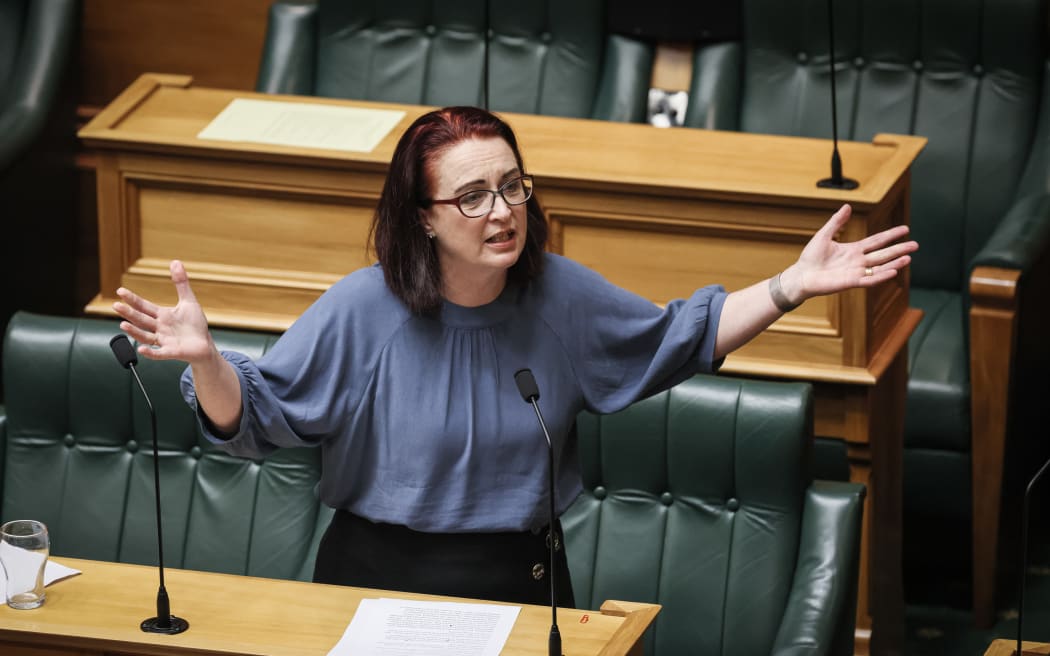
Revenue Minister Simon Watts Photo: RNZ / Samuel Rillstone
Parliament has repealed the Tax Principles Reporting Act under urgency. It would have required a report on the tax system to be published by the end of the year.
The Green Party says the government's urgency is to keep the first report on the tax system's fairness from public view.
The government on Tuesday announced its plan to repeal the law, arguing it would have taken extra resources at a time when the focus should be on addressing the cost of living and getting the government's books back in order.
Revenue Minister Simon Watts had said repealing it under urgency was needed because of the short deadline before the first report was due.
Speaking at the third reading on Thursday afternoon, he said the repeal would free future governments from "the restrictive descriptors of tax principles set out in the Act".
"It allows them to pursue the tax policies they were elected to carry out," he said.
"It is saving taxpayers money and compliance costs by stopping them from having to provide unnecessary information to Inland Revenue, and it will stop Inland Revenue from having to devote precious resources to preparing reports on the tax system in relation to certain tax principles.
"Those resources could and should be better used, including actually collecting tax."
Labour's Revenue spokesperson Deborah Russell said the act would have simply given more information about the tax system so citizens could easily judge it.

Labour's Deborah Russell in Parliament (file photo) Photo: Phil Smith
"Governments are still-always have been-free to set their own tax policies. What this bill would have done would have enabled some judgements to be made about those tax policies using descriptors that are long established and widely agreed as the appropriate descriptors and the appropriate principles to use for assessing a tax system. But this Government is too scared to allow that to happen," she said.
Heading into the year's final Question Time on Thursday, the Green Party's revenue spokesperson Chlöe Swarbrick said the law mattered.
"Because we know that we currently do not have consistent regular reporting on the way that our tax system works. We know that in light of what the IRD and Treasury supplementary reports at the beginning of this year confirmed a lot of New Zealanders' suspicion that our tax system is fundamentally unfair.
"It sees the wealthiest New Zealanders pay an effective tax rate less than half that of the average New Zealander."
The party's finance spokesperson James Shaw said the first report would have been at least drafted, but suggested the government did not want New Zealanders to know how much tax its donors paid in comparison to the wider public.
"They don't want New Zealanders to know how little tax they're paying in comparison with the average New Zealander. So, given that the National, ACT and New Zealand First parties have said they agree with the principles that are in the Act, clearly that's not a reason to repeal it.
"Given that it'll make no difference to the ability of lower and middle income to meet their living costs, that's not a reason to repeal it. The question then is in whose interests are they repealing this Act, because it means that there will be less transparency about the tax system.

Green Party co-leader and Finance spokesperson James Shaw Photo: RNZ / Angus Dreaver
"I think that the urgency is due to the fact that the first report comes out on the 23rd of December and they want to make sure that they repeal the act in order to not have to release that report because they know what's going to be in it."
Shaw said the report would have been drafted - if not already on its way to the printers - and the party would seek to have the tax principles report released under the Official Information Act next year.
The law had required the Inland Revenue Commissioner to publish a full report every three years and an interim report every year, on the country's tax settings and its effects on different communities of taxpayers.
The report would have included measurements of, at minimum, income distribution and income tax paid, the distribution of exemptions from tax and lower rates of taxation, perceptions of integrity of the tax system, and taxpayers' compliance with the law.
This was to measure the system against principles of horizontal and vertical equity, efficiency, revenue integrity, compliance and administrative cost, certainty and predictability, and flexibility and adaptability.
National and ACT both opposed the bill when it was originally passed, and National pledged to repeal it if elected to government.






